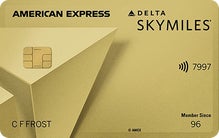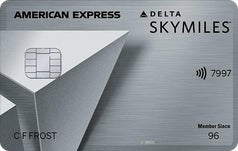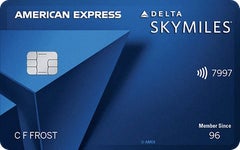Delta SkyMiles® Gold American Express Card review: Enough perks to justify the annual fee
Rewards for foodies and Delta loyalists at a reasonable price.
The Bankrate promise
At Bankrate we strive to help you make smarter financial decisions. While we adhere to strict , this post may contain references to products from our partners. Here's an explanation for .
Snapshot
4.1
Bottom line
If you spend heavily across Delta, U.S. restaurant and U.S. supermarket purchases, the SkyMiles Gold may be the best Delta Air Lines card to start with, thanks to its low cost and helpful travel perks for frequent flyers.
Best Delta card for value travelers
on American Express's secure site
See Rates & Fees, Terms ApplyIntro offer
Earn up to 90,000 Bonus Miles
Rewards rate
1X - 2X
Annual fee
$0 introductory annual fee for the first year, then $150.
APR
19.49%-28.49% Variable
4.1
Bankrate score
Rewards value
APR
Rewards flexibility
Features
Why you'll like this: You’ll earn rewards at a boosted rate on Delta purchases and in a mix of everyday spending categories, making it a strong standalone option.
Reward Details
Card Details
Remove a card to add another to compare
Remove a card to add another to compare
Delta SkyMiles® Gold American Express Card overview
Less-frequent Delta travelers who want to stockpile miles from their household and dining expenses will likely get the most value out of the Delta SkyMiles® Gold American Express Card.
Despite its annual fee, the Delta Gold card’s unlimited rewards, welcome offer and travel benefits outweigh its no-annual-fee sibling, the Delta SkyMiles® Blue American Express Card. Considering the first free checked bag or the annual flight credit perks can cover the annual fee, the SkyMiles Gold might work well as a starter Delta card.
Travelers chasing immediate savings over luxury benefits could easily find that this card is the best Delta credit card for their occasional flights. However, the co-branded SkyMiles Gold isn’t as flexible as a general-purpose travel credit card, which may be worth it if you’re an infrequent traveler or aren’t as eager for Delta-specific perks.
-
Rewards
- 2X miles on restaurant purchases (plus takeout and delivery in the U.S.)
- 2X miles at U.S. supermarkets
- 2X miles on Delta purchases
- 1X miles on all other purchases
Expert Appraisal: Good
See our expert analysis -
Welcome offer
-
Earn 70,000 Bonus Miles after you spend $3,000 in purchases with your new Card, and an additional 20,000 bonus miles after you make an additional $2,000 in purchases on the Card, both within your first 6 months. Ends 04/01/2026.
Expert Appraisal: Good
See our expert analysis -
-
Rates and fees
- Annual fee: $0 introductory annual fee for the first year, then $150.
- APR: 19.49%-28.49% Variable APR
- Cash advance fee: $10 or 5 percent of the amount of each cash advance, whichever is greater
- Foreign transaction fee: None
- Late payment fee: Up to $40
- Returned payment fee: Up to $40
- Overlimit fee: None
Expert Appraisal: Typical
See our expert analysis -
Other cardholder perks
- Plan It® — Split purchases of $100 or more into equal monthly installments with a fixed fee
- 20 percent statement credit on Delta in-flight purchases
- $200 Delta flight credit (after spending $10,000 or more on your card in a calendar year)
- $100 Delta Stays Credit (up to $100 as a statement credit each year after booking prepaid hotels or vacation rentals with your Card through Delta Stays on delta.com).
- First checked bag free
Expert Appraisal: Typical
See our expert analysis
Delta SkyMiles Gold pros and cons
Pros
-
The $150 annual fee is $0 the first year and easy to offset afterward.
-
This card earns slightly elevated rewards on everyday expenses, like dining and groceries, which can help infrequent travelers stack up on rewards.
-
It carries several valuable travel benefits, flight and hotel credits and a free first checked bag.
Cons
-
Lackluster redemption options and no definite award redemption value restrict the reward value of this card.
-
Despite its annual fee, this card doesn't offer many luxury perks, like complimentary airport lounge access.
-
If you're a frequent Delta customer, this card may disappoint since it doesn't offer any bonuses or status boosts to help you earn Medallion Status.
First-year value vs. ongoing value
Here’s a look at your potential first-year and ongoing value based on our credit card rating methodology and an annual spend of around $22,000. Thanks to the card’s generous welcome offer, you'll get great first-year value. Plus, a $0 annual fee for the first year only sweetens the pot ($150 annually thereafter). And if you take advantage of the free checked bag, Delta Stays credit and Delta flight credit perks every calendar year, you can add to the card's long-term value and offset the annual fee. With that in mind, the Delta Gold could be a good trial to see whether you may need to upgrade or downgrade your Delta card if it turns out the annual fee or absent Status Boost are deal breakers.
| Benefits and Costs | First-year value | Ongoing value (no welcome offers) |
|---|---|---|
| Yearly rewards* | +$317 | +$317 |
| Welcome offers |
+ Up to $1,080 value (Earn 70,000 Bonus Miles after you spend $3,000 in purchases with your new Card, and an additional 20,000 bonus miles after you make an additional $2,000 in purchases on the Card, both within your first 6 months. Ends 04/01/2026.) (Assuming a value of around 1.2 cents per mile.) |
— |
| Perks (of monetary value) |
|
|
| Annual fee | -$0 | -$150 |
| Total value | Up to $1,697 | $467 |
Why you might want the Delta SkyMiles Gold American Express Card
The Delta SkyMiles Gold Amex is a solid choice for frequent Delta flyers who want to earn high-value rewards on food spending. Plus, you can easily offset your annual fee with perks and a welcome offer.
Rewards: Earns valuable miles in common categories
The Delta SkyMiles Gold offers 2X miles on Delta purchases, 2X miles at restaurants (including U.S. delivery and takeout) and U.S. supermarkets (excluding superstores like Walmart® and Target) and 1X miles on all other purchases.
It should be easy to earn rewards since dining and supermarkets are common expenses. But even if you aren’t a foodie, you’ll still rack up the miles as long as you spend frequently on Delta airfare.
Redemption value: A solid base value with the potential for higher savings
The value of your miles varies based on how you redeem your rewards, but Delta SkyMiles are among the more valuable airline miles. Based on Bankrate’s latest points and miles valuations, Delta SkyMiles are worth an estimated 1.2 cents each when redeemed for award flights. This valuation places Delta among the top domestic airline rewards programs.
| Rewards program | Bankrate value* | Estimated value of 50,000 points/miles |
|---|---|---|
| 1.5 cents | $750 | |
| 1.3 cents | $650 | |
| 1.2 cents | $600 | |
| 1.1 cents | $550 | |
| 1.0 cents | $500 | |
| 0.9 cents | $450 |
* Based on weighted average of median point/mile values across economy and first/business class fares.
If you want to ensure you’re getting the best value, calculate the value of your miles before you book your flight.
To calculate how much your miles are worth, divide the cash cost of the ticket you want to purchase by the amount of points needed.
Let’s say you’re booking a flight from Boston to Miami that costs either $365 or 28,500 miles.
$365 / 28,500 = $0.0128 or 1.3 cents
Your points would be worth 1.3 cents each. This valuation is higher than Bankrate’s estimated value of 1.2 cents per mile, so you’d get a great deal.
If the same $365 flight costs 54,000 miles, your miles would only be worth 0.7 cents ($365 / 54,000 = $0.0067), which is well below our estimated valuation of 1.2 cents per mile. If possible, you’re better off searching for a different flight or paying with cash and saving your miles for another trip.
Redemption options are limited compared to non-branded travel cards. You can't transfer miles to other loyalty programs, and options like “Pay with Miles,” where you can get $50 off every 5,000 miles redeemed, only let you book travel or upgrade seats with Delta, not any of its SkyTeam partner airlines. Non-travel redemption options are also few, and your value per point may decrease.
Perks: Convenient travel benefits for hassle-free flying
The Delta Gold card carries a host of benefits that can save you time and money when you fly with Delta:
- $200 annual Delta flight credit after spending $10,000 in one calendar year
- Up to $100 annually as a statement credit each year on prepaid bookings with your card through Delta Stays or delta.com.
- 15% off when using miles to book Delta flights through delta.com and the Fly Delta app (not applicable to partner-operated flights or to taxes and fees)
- $50 off your flight cost for every 5,000 miles redeemed with Pay With Miles on delta.com
- First checked bag is free on Delta flights
- Zone 5 Priority Boarding
- 20 percent statement credit back on select in-flight purchases
- Travel protections, including baggage insurance and car rental loss and damage insurance
- Shopping protections, including extended warranty coverage and purchase protection
These features can justify the Delta Skymiles Gold card’s annual fee and perks like priority boarding can make traveling a bit easier.
The Delta SkyMiles Gold also carries its weight with baggage insurance and car rental loss and damage insurance. But competing cards might offer more attractive perks. The Chase Sapphire Preferred® Card, for instance, offers trip cancellation and interruption insurance, one of the most coveted travel protections, plus bonus points on your account’s anniversary and other annual credits.
Cardholders also won't enjoy any Medallion Status Boost, limiting its value for rewards enthusiasts. While the Delta Gold card allows you to earn “Medallion Qualification” currency, achieving top Delta perks and rewards rates this way is more difficult without a premier Delta card.
Welcome offer: Reasonable value for reasonable spending
You can earn a welcome bonus of 70,000 Bonus Miles after you spend $3,000 in purchases with your new Card, and an additional 20,000 bonus miles after you make an additional $2,000 in purchases on the Card, both within your first 6 months. Ends 04/01/2026. Based on Bankrate’s latest mile valuations, we estimate this bonus can be worth around $900 in travel with Delta if you only get 1 cent per mile in redemption value.
The welcome bonus value is decent, considering the card's annual fee is $0 in the first year ($150 after that). The value of your welcome offer could help offset the cost of holding the card for a few years or more.
Why you might want a different travel credit card
If you don’t fly Delta very often, this card might not make much sense for you. But even if you do fly Delta, this card's lack of an intro APR and high fees may make a general travel rewards card a better fit.
APR: No zero-interest periods and a high APR
This card lacks intro APR periods for purchases and balance transfers. Although this is typical for co-branded travel cards, several general travel cards have intro APR periods, giving them great short-term value for new cardholders with current card debt or new purchases on the horizon. Financing flights, hotel stays, food and other purchases without interest temporarily can make visiting your dream destination a much more relaxing experience.
Also, the APR on this card can be relatively high, so you might want to look elsewhere if you tend to carry a balance on your card. You'll also face late payment fees and a penalty APR for any missed payments.
We tried it: Here’s what our experts say
Frequent traveler and Bankrate writer Ryan Flanigan sees a ton of value in using the Delta SkyMiles Gold for everyday purchases. Based on his experience as the owner of a binder full of travel cards, he says maximizing everyday rewards rates can make it easy to offset card costs.
Bankrate staff insights
Best cards to pair with the Delta SkyMiles Gold card
Other Membership Rewards-earning American Express cards can not only transfer points to Delta, but also rack up points that are more valuable when transferred to other airline partners. Also, you might pair with a general travel card to give you more flexibility.
How the Delta Gold card compares to other travel rewards cards
The Delta SkyMiles Gold American Express Card has plenty of perks for individuals looking for an entry point into co-branded airline credit cards and offers ample opportunity to offset the annual fee. However, if you’re a frequent traveler who doesn’t mind splurging on a higher annual fee to enjoy more premium benefits, another travel card might be ideal.

Annual fee
Intro offer
Earn 70,000 Bonus Miles after you spend $3,000 in purchases with your new Card, and an additional 20,000 bonus miles after you make an additional $2,000 in purchases on the Card, both within your first 6 months. Ends 04/01/2026.
Rewards rate
Earn 2X miles on Delta Purchases, restaurants, and U.S. supermarkets. Earn 1X miles on all other eligible purchases.
Recommended Credit Score
A FICO score/credit score is used to represent the creditworthiness of a person and may be one indicator to the credit type you are eligible for. However, credit score alone does not guarantee or imply approval for any financial product.

Annual fee
Intro offer
Earn 80,000 Bonus Miles after you spend $4,000 in purchases with your new Card, and an additional 20,000 bonus miles after you make an additional $2,000 in purchases on the Card, both within your first 6 months. Ends 04/01/2026.
Rewards rate
Earn 3X Miles on Delta purchases and purchases made directly with hotels. Earn 2X Miles at restaurants worldwide including takeout and delivery in the U.S., and at U.S. supermarkets. Earn 1X Miles on all other eligible purchases.
Recommended Credit Score
A FICO score/credit score is used to represent the creditworthiness of a person and may be one indicator to the credit type you are eligible for. However, credit score alone does not guarantee or imply approval for any financial product.

Annual fee
Intro offer
LIMITED-TIME OFFER: Enjoy $250 to use on Capital One Travel in your first cardholder year, plus earn 75,000 bonus miles once you spend $4,000 on purchases within the first 3 months from account opening - that’s equal to $1,000 in travel
Rewards rate
Earn 5X miles on hotels, vacation rentals and rental cars booked through Capital One Travel. Earn unlimited 2X miles on every purchase, every day.
Recommended Credit Score
A FICO score/credit score is used to represent the creditworthiness of a person and may be one indicator to the credit type you are eligible for. However, credit score alone does not guarantee or imply approval for any financial product.
Is the Delta Gold card right for you?
Despite the annual fee after the first year, the Delta SkyMiles Gold American Express card is a terrific starter card for:
- Fans of Delta who take a handful of trips a year.
- Value-minded travelers who aren't chasing elite status perks.
- Those who want rewards on everyday purchases at restaurants and supermarkets.
- Those who value its free checked bag perk and annual travel credit.
Alternative picks
If you don’t think the Delta SkyMiles Gold is right for you, you might be better off choosing a non-branded card, especially if flexible rewards for day-to-day expenses are your priority. Consider one of these alternatives:
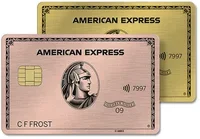
American Express® Gold Card
Best for dining and earning Membership Rewards points
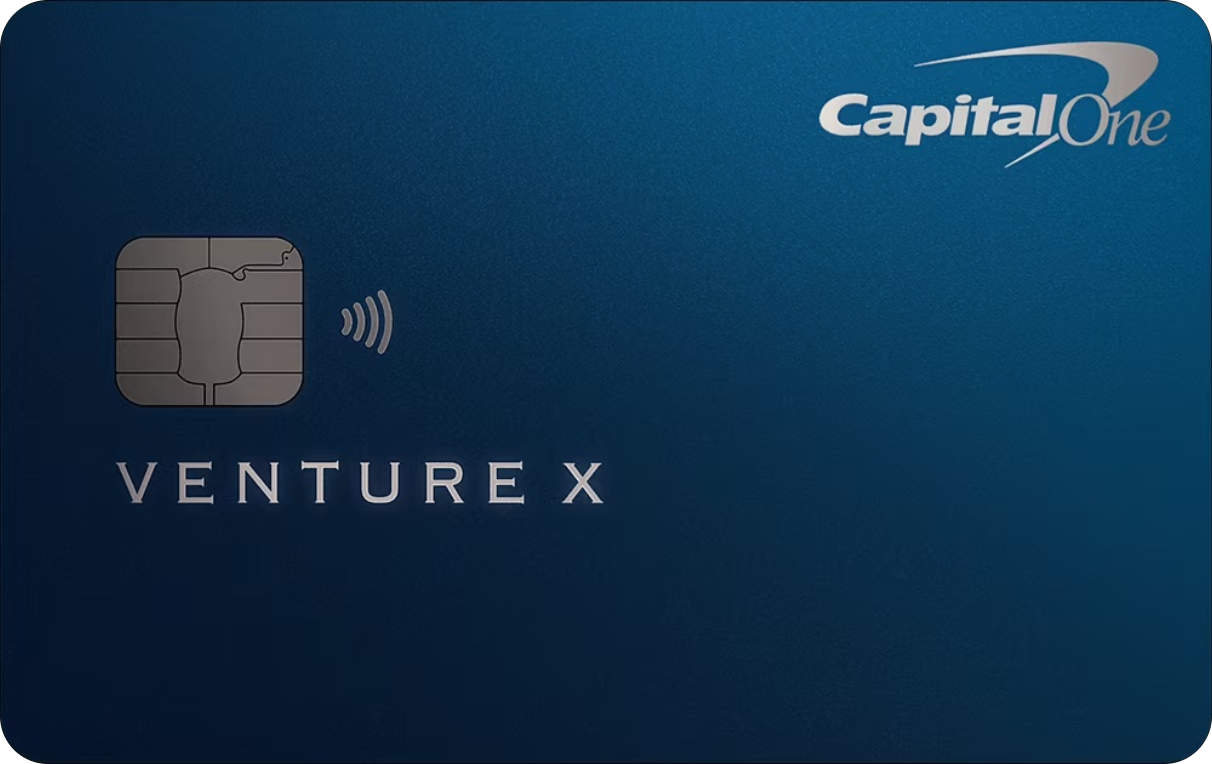
Capital One Venture X Rewards Credit Card
Best for earning flat-rate points on general travel
For rates and fees of the Delta SkyMiles Gold card, please See Rates & Fees.
Eligibility and Benefit level varies by card. Terms, Conditions and Limitations apply. Please visit americanexpress.com/benefitsguide for more details. Underwritten by Amex Assurance Company.
*All information about the American Express® Green Card has been collected independently by Bankrate. The card details have not been reviewed or approved by the issuer.
Frequently asked questions
How we rated this card
We rate credit cards using a proprietary card scoring system that ranks each card’s estimated average rewards rate, estimated annual earnings, welcome bonus value, APR, fees, perks and more against those of other cards in its primary category.
Each card feature is assigned a weighting based on how important it is to people looking for a card in a given category. These features are then scored based on how they rank relative to the features on other cards in the category. Based on these calculations, each card receives an overall rating of 1-5 stars (with 5 being the highest possible score and 1 being the lowest).
We analyzed over 150 of the most popular rewards and cash back cards to determine where each stacked up based on their value, cost, benefits and more. Here are some of the key factors that influenced this card’s overall score and how the score influenced our review:
* See the online application for details about terms and conditions for these offers. Every reasonable effort has been made to maintain accurate information. However all credit card information is presented without warranty. After you click on the offer you desire you will be directed to the credit card issuer's web site where you can review the terms and conditions for your selected offer.
Editorial Disclosure: Opinions expressed here are the author's alone, and have not been reviewed or approved by any advertiser. The information, including card rates and fees, is accurate as of the publish date. All products or services are presented without warranty. Check the bank’s website for the most current information.
